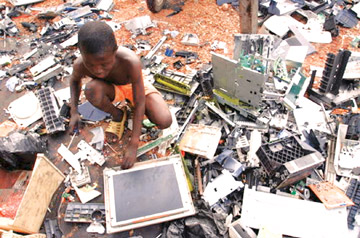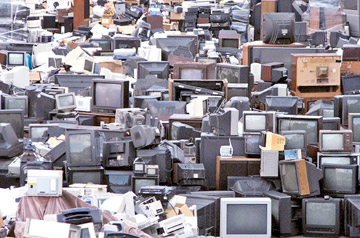|
e-waste piles up in tons the world over:
Islandwide collection from May 27-June 2
By Dhaneshi Yatawara
Production and consumption of more electronic and electrical
equipment have significantly increased around the world. Much advertised
‘stock clearance’ and ‘seasonal sales’ entice us to buy new electrical
and electronic items, to replace the old or outmoded ones. Have we ever
thought as to how we are going to dump the old ones?
 |
|
Boys breaking computer
components in order to reclaim metals
such as copper and aluminium. Photo via Newscom |
 |
Waste Electronic and Electrical Equipment (WEEE) or ‘e-waste’, is
accumulated in the world in millions of tons per year. With the advent
of technology, household electrical and electronic items started
flooding into Sri Lanka, in the 1980s.
Toxic substances in electronic waste include lead, mercury, cadmium,
Polyclorinated Biphenyles, Brominated flame retardants. These toxic
substances can be bio-accumulating in fatty tissues and biomagnifying up
to food chains. Televisions, radios, refrigerators, computers and even
mobile phones contain these toxic pollutants and other metallic and
chemical compounds. While it is safer to operate them when they are new,
these toxic chemicals can leak out over time, getting released into the
atmosphere, to become serious environmental and health hazards.
Long-term exposure to these substances can cause damage to the nervous
system, kidneys and bones, as well as to the reproductive and endocrine
systems. This has become a serious issue in industrialised countries.
Known as clean mechanism to reduce power consumption, CFL bulbs
(Compact fluorescent light) too are now increasing in use. But little
known is that these bulbs too need to be discarded with care, as they
contain a little Mercury within. They are perfectly safe when the bulb
is intact. But when broken, this metal can leak, causing pollution.
Hence, these should not be discarded by just throwing them into the
garbage bin, which will end up in a landfill site.
Sri Lanka is not alone. Safe management of e-waste is becoming a
major problem in many countries.
Due to the fact that the life span of computers has dropped in
developed countries from six years in 1997 to just two years in 2005,
and mobile phones have a lifespan of even less than two years, the
amount of generated e-waste per year grows rapidly, states the Global
partnership on Waste Management of the United Nations Environment
Program. As they further explain the global phenomenon this has a major
impact on developing countries as loopholes in the current Waste
Electrical and Electronic Equipment (WEEE) Directives allow the export
of e-waste from developed to developing countries. Accordingly 70% of
the collected WEEE ends up in unreported and largely unknown
destinations.
Inappropriate methods like open burning, which are often used by the
informal sector in developing countries to recover valuable materials,
have heavy impact on human health and the environment.
During the sixth meeting of the Conference to the parties to the
Basel Convention (BC) for the Transboundary Movement of the Hazardous
Waste, e-waste was considered as one of the main streams of wastes to be
managed properly due to the fact that there are increasing quantities of
e-wastes being exported from developed countries to developing
countries, where there is inadequate capacity to manage them in an
environmentally sound manner.
The Central Environmental Authority (CEA) in collaboration with
several other stakeholder companies has initiated a program to collect
all discarded electronic items by introducing e-waste collection points
islandwide. This National e-waste management program of Sri Lanka was
initiated in 2010, in collaboration with 14 private sector partner
companies including manufacturers, importers and brand owners of the
e-waste. These companies set up collecting mechanisms, where sellers of
electronic items finance the treatment of their own-branded e-waste,
discarded by their customers. For example, mobile phone collection
centers are set up to collect the discarded phones. The CEA has also
entered into a Memorandum of Understanding (MoU) under which brand
owners or manufacturers of electronic products will set up these
collecting centres in Sri Lanka.
The National Program for 2014 is organizing a special week for
collecting e-waste, islandwide. This is scheduled to commence on May 27
and will run up to June 2.
The CEA in collaboration with number of private companies have set up
special locations to collect e-waste in each district. Within this week
e-waste can be handed over to all the district offices of the CEA. By
contributing to this the public will not only doing justice to the
environment but they will be taking the initial step in providing a
hazard free world to the future generation.
***************
The following are the collection centres
Western Province
Colombo: Campbell Park on May 28
Kalutara: Holy Cross grounds on May 29
Gampaha: Urban Council grounds on May 30
Negambo: Opposite Solid Computers on May 28
-------
Southern Province
Galle: Near Samanala Park on May 28
Matara: Uyanwatta Stadium on May 30
Hambantota: Thissamaharama Urban Council grounds on May 30
-------
North Central Province
Anuradhapura: Town Hall grounds on May 29
Polonnaruwa: Thamankaduwa Pradeshiya Sabha premises on May 30
-------
Central Province
Kandy: Mahayiyawa grounds on May 29 / Getambe grounds May 31
Matale: Dambulla Pradeshiya Sabha on May 29 / CEA District office May 29
Nuwara Eliya: Municipal grounds – on June 02
-------
Sabaragamuwa Province
Ratnapura: Near L.B. Finance on May 29
Kegalle: Nidahas Mawatha on May 29
Badulla: June 02
Monaragala: Monaragala CEA office on June 02
-------
Eastern Province
Ampara: Urban Council grounds and Kalmunai Municipal Council on June
1
Batticaloa: Kathankudi Urban Council on June 1
Trincomalee: Urban Council on June 1
-------
North Western Province
Kurunegala: Wariyapola Pradeshiya Sabha on June 2
Puttalam: Urban Council on May 30
-------
Northern Province
Jaffna: Duraiyappah Stadium on May 30
Kilinochchi: Karachchi Pradeshiya Sabha on May 28
Mullaitivu: Maritimpattu Pradeshiya Sabha on May 29
Vavuniya: Urban Council grounds on May 29
Mannar: Urban Council premises on May 30 |

